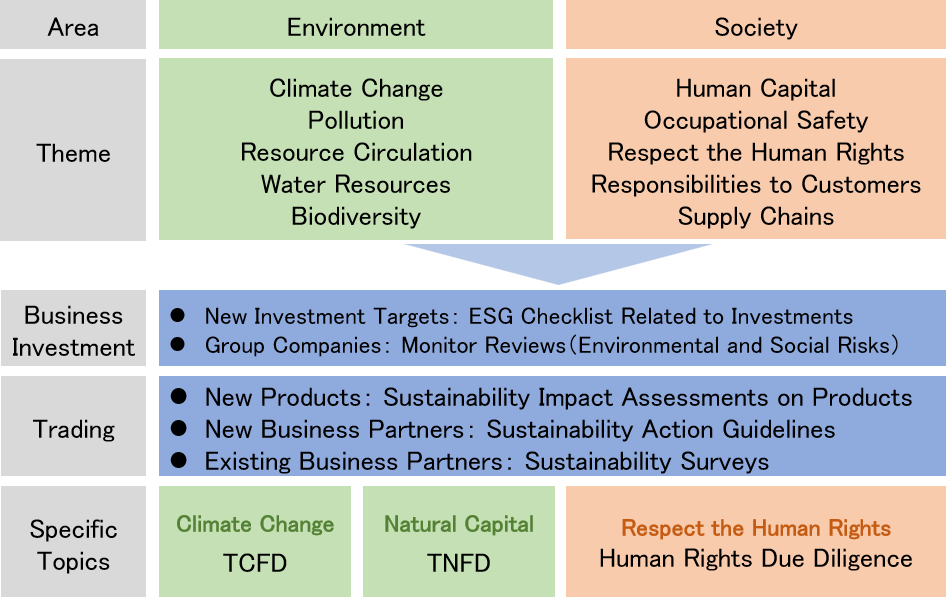Management of Sustainability-related Risks
Integration into the Enterprise Risk Management System
ITOCHU Group recognizes that risk management is an important management priority. Accordingly, we have established a basic policy for risk management at the Group with reference to the COSO-ERM framework, and developed the enterprise risk management systems and methodologies. We recognize factors that may have a major future impact on our financial situation and performance as key risks. To deal with these key risks, we have established a variety of in-house committees and responsible divisions. At the same time, we have set up the necessary risks management structures and management methods. For example, we have set up various management rules, investment criteria, risk exposure limits and transaction limits, and reporting and monitoring structures. We then manage risks and opportunities individually and on a companywide basis.
ITOCHU conducts reviews of key risks across the organization every half-year. From the results, we recognize that sustainability-related risks span a wide range, including governance, compliance, information security, labor management, human resources, and environmental and social issues. Each responsible division takes the lead in formulating internal management systems and monitoring these risks. The results are appropriately reported and monitored in accordance with the governance processes of company-wide risk management, striving to enhance risk management.
Please refer to the “Governance>Risk Management” for details.
Sustainability-related Risks and Opportunities
Evaluation of Sustainability-related Risks and Opportunities
We gather information on a regular basis regarding regulatory and other trends related to sustainability, including climate change, natural capital, supply chain issues, and human rights, as well as sustainability-related risks and opportunities impacting our business operations throughout the world. Based on this information, the sales department and certain administrative divisions quantitatively assess risks and opportunities related to the environmental, social, and governance themes listed below, using evaluation indicators such as the frequency and severity of risks and the scope of operations/activities. We visualize the impact from both the perspective of societal impact and the impact on ITOCHU Group, thereby identifying particularly important risks and opportunities.
Internal Risk Management System Concerning Major Environmental and Social Risks

Management of Sustainability-related Risks and Opportunities
ITOCHU Group, under the governance of the enterprise risk management system, we manage sustainability-related risks and opportunities associated with business operations as follows.
Business Investment
ITOCHU assesses the social and environmental impact of its business investment projects and the governance status of the investment targets in advance using the “ESG Checklist for Investments.” Subsequently, at each business segment’s DMC (Division Company Management Committee), we deliberate on investments, loans, guarantees, and businesses management that may affect Company’s management policies and management. These decisions are made by the company president. After investments, we conduct an annual monitoring review of the group companies.
Trading
When we handle new groups of products in trade, we investigate significant environmental and social risks and impacts through LCA (Life Cycle Assessment) analysis methods and establish a system and monitoring mechanism to comply with appropriate legal regulations. For new business partners, we notify them of our Sustainability Action Guidelines and seek their understanding of our ESG approach. For major business partners, we annually assess their ESG compliance through a sustainability survey. If there are concerns, we conduct detailed checks through face-to-face meetings or on-site visits and take necessary measures.
Other Management on Thematic Basis
We analyze the impact of environmental changes on business and the effectiveness of countermeasures in accordance with the TCFD framework for climate change and the TNFD framework for natural capital. We also engage in human rights due diligence by conducting on-site investigations with suppliers and Group companies to ensure that we are not complicit in human rights violations.
Operational-level Risk Management System
We on Group basis, delegates authority to its operating segments in order to enable swift decision-making and to manage sustainability-related risks and opportunities associated with their business operations. DMC, which serves as an advisory body to the Division Company President of each operating segment, who hold responsibility for overseeing the management and business activities of their respective companies, annually reviews business risks and opportunities, including those related to environmental, social and other sustainability-related issues, and formulates the plan that sets out a range of measures including risk management and business priorities. The plan for each operating segment is submitted to the HMC (Headquarters Management Committee) and/or to the Board of Directors, which serves as the Group’s supervisory body, and is approved by the Board of Directors following a final comprehensive analysis and deliberation from a sustainability perspective.
